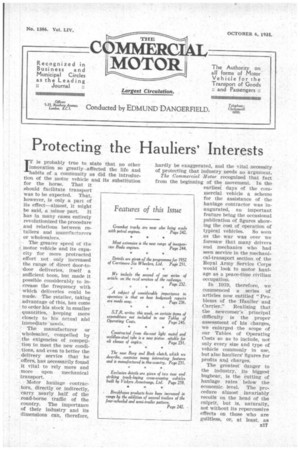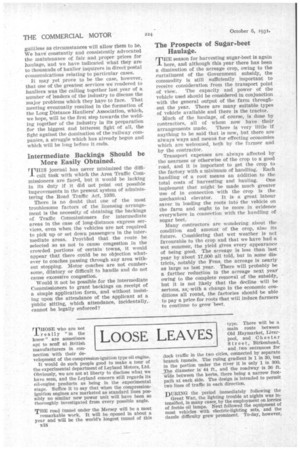Protecting the Hauliers' Interests
Page 35

Page 36

If you've noticed an error in this article please click here to report it so we can fix it.
IT is probably true to state that no other innovation so greatly affected the life and • habits of a community as did the introduction of the motor vehicle and its substitution for the horse. That it should facilitate transport was to be expected. That, however, is only a part of its effect—almost, it might be said, a minor part. It has in many cases entirely revolutionized the procedure and relations between re' tailers and manufacturers or wholesalers. • The greater speed of the .i. motor vehicle and its capacity for more protracted effort not only increased the range of direct door-to-door deliveries, itself a sufficient boon, but made it possible considerably to• Increase the frequency with which deliveries could be made. The retailer, taking advantage of this, has come to order his stock in smaller , quantities, keeping more closely to his actual eat immediate 'needs, 'the manufacturer or i wholesaler, compelled by the exigencies of competi, tion to meet the new condi, tions, and even to better the :delivery service that he _offers, has necessarily found it vital • to rely more and more . upon • mechanical transport.
Motor haulage contractors, directly or indirectly, carry. .nearly half of the • road-borne traffic of the country. The importance of their industry and its dimensions Can, therefore, hardly be exaggerated, and the vital necessity of protecting that industry needs no argument. The Commercial Motor recognized that fact from the beginning of the movement. Iti the earliest days of the commercial vehicle a scheme for the assistance of , the haulage contractor was 'inaugurated, an important feature being the occasional publication of figures showing the cost of operation of typical vehicles. 8o soon as the war was over we foresaw that many drivers and mechanics who had seen service in the mechanical-transport section of the Royal Army Service Corps would look to motor haulage as a peace-time civilian occupation.
In 1919, therefore, we conimenced aseries of articles now entitled "Problems of the -1-laulter and Carrier." Realizing that the newcomer's principal difficulty is the proper assessment of his charges, we enlarged the scope of our Tables of Operating Costs so as to include, -not only every size and type of vehicle commonly in use, but also hauliers' figures for profits and charges.
The greatest danger to the industry, its biggest bugbear, is the butting of haulage rates below the economic, level.The procedure almost. invariably recoils on the head of the culprit, but is, naturally, not without its repercussive effects on those who are guiltless, or, at least, as guiltless as circumstances will allow them to be. We have constantly and consistently advocated the maintenance of fair and proper prices for haulage, and we have indicated what they are to thousands of haulier inquirers in direct postal communications relating to particular cases. It may yet prove to be the case, however, that one of the greatest services we rendered to hauliers was the calling together last year of a number of leaders of the industry to discuss the major problems which they have to face. That meeting eventually resulted in the formation Of the Long Distance Hauliers' Association, which, we hope, will be the first step towards the welding together of the industry in its preparation for the biggest and bitterest fight of all, the fight against the domination of the -railway companies, a struggle which has already begun and which will be long before it ends.
Intermediate Backings Should be More Easily Obtained.
frHIS journal has never minimized the diffi-Icult task with Which the Area Traffic Commissioners are faced, but it would be lacking in its duty if it did not point out possible Improvements in the present system of administering the Road Traffic Act, 1930. There is no doubt that one of the most troublesome factors of the licensing arrangement is the necessity of obtaining the backings of Traffic Commissioners for intermediate areas in the case of long-distance express services, even when the vehicles are not required to pick up or set down passengers in the intermediate areas. Provided that the route be selected So as not to cause congestion in the crowded portions of certain towns, it would appear that there could be no objection whatever to coaches passing through any area without stopping. Motor coaches are not cumbersome, dilatory or difficult to handle and do not cause excessive congestion. Would it not be possible for the intermediate Commissioners to grant backings on receipt of a simple application form, and without insisting upon the attendance of the applicant at a Public sitting, which attendance, incidentally, cannot be legally enforced?
The Prospects of Sugar-beet Haulage.
THE season for harvesting sugar-beet is again here, and although this year there has been a diminution of the acreage crop, owing to the curtailment of the Government subsidy, the commodity is still sufficiently important to receive consideration from the transport point of view. The capacity and power of the vehicle used should be considered in conjunction with the general output of the farm throughout the year. There are many suitable types of vehicle available and there is the tractor. Much of the haulage, of course, is done by contractors, all of whom now have their arrangements made. There is very little if anything to be said that is new, but there are always ways and means for effecting economies which are welcomed, both by the farmer and by the contractor. Transport expenses are always affected by the nearness or otherwise of the crop to a good • road, and it is important to get the crop to the factory with a minimum of handling. Each handling of a root means an addition to the total costs of harvesting and hauling. One implement that might be made much greater use of in connection with the crop is the mechanical elevator. It is a great labour saver in loading the roots into the vehicle on the farm and ought to be more in evidence everywhere in connection with the handling of sugar beet. Many contractors are wondering about the condition and amount of the crop, also its future. Considering that wet weather is not favourable to the crop and that we have had-a wet summer, the yield gives every appearance of being good. The acreage is less than last year by about 17,000 all told, but in some districts, notably the Fens, the acreage is nearly as large as last year. . There will probably be a further reduction in the acreage next year owing to the complete removal of the subsidy, but it is not likely that the decline will be serious, as; with a change in the economic conditions all round, the factories should be able to pay a price for roots that will induce farmers to continue to grow 'beet.




































































































